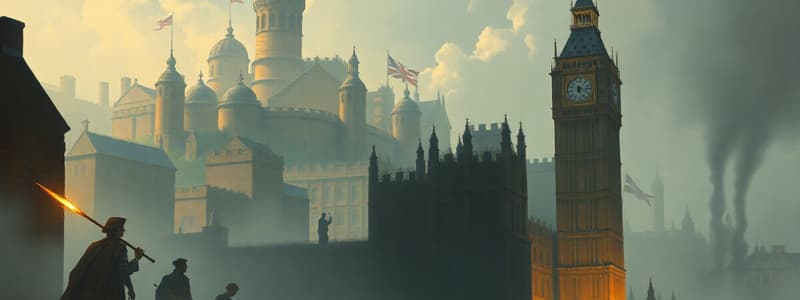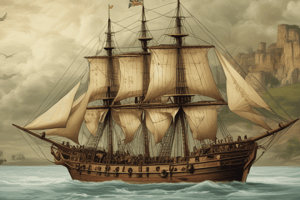Podcast
Questions and Answers
What major financial challenge was Britain facing after the war?
What major financial challenge was Britain facing after the war?
- Inflation
- Postwar debt (correct)
- Trade deficits
- High unemployment rates
Which of the following was not a financial issue Britain faced postwar?
Which of the following was not a financial issue Britain faced postwar?
- Postwar debt
- Need to finance administration of new lands
- Surplus in the budget (correct)
- High taxes
In addition to postwar debt, what financial requirement did Britain have?
In addition to postwar debt, what financial requirement did Britain have?
- Funding military expansion
- Subsidizing exports
- Financing administration of acquired lands (correct)
- Developing domestic industries
How did high taxes relate to Britain's financial situation postwar?
How did high taxes relate to Britain's financial situation postwar?
What best describes Britain's economic condition after gaining new territories?
What best describes Britain's economic condition after gaining new territories?
Which of the following contributed to Britain's financial strain postwar?
Which of the following contributed to Britain's financial strain postwar?
What can be inferred about Britain's tax system postwar?
What can be inferred about Britain's tax system postwar?
Which aspect of Britain's postwar financial strategy is indicated in the content?
Which aspect of Britain's postwar financial strategy is indicated in the content?
What was a significant handicap for the Continental Army during the American Revolution?
What was a significant handicap for the Continental Army during the American Revolution?
Who were the Loyalists during the American Revolution?
Who were the Loyalists during the American Revolution?
What role did the Iroquois Nation play during the American Revolution?
What role did the Iroquois Nation play during the American Revolution?
What motivated many slaves to join the British forces during the American Revolution?
What motivated many slaves to join the British forces during the American Revolution?
Why did some Loyalists oppose the American Revolution despite initial grievances with British policies?
Why did some Loyalists oppose the American Revolution despite initial grievances with British policies?
What was one of the measures taken by the Coercive Acts against Massachusetts?
What was one of the measures taken by the Coercive Acts against Massachusetts?
Which act allowed the governors to house soldiers in private homes?
Which act allowed the governors to house soldiers in private homes?
What was the southern boundary of Quebec established by the Quebec Act?
What was the southern boundary of Quebec established by the Quebec Act?
Which colony did not participate in the First Continental Congress?
Which colony did not participate in the First Continental Congress?
What did the Suffolk Resolves call for the colonists to do?
What did the Suffolk Resolves call for the colonists to do?
What was the primary complaint of the First Continental Congress regarding actions taken by Parliament?
What was the primary complaint of the First Continental Congress regarding actions taken by Parliament?
How did the First Continental Congress plan to address their grievances?
How did the First Continental Congress plan to address their grievances?
What did the final declaration of the First Continental Congress ultimately emphasize?
What did the final declaration of the First Continental Congress ultimately emphasize?
What was a significant aspect of the Coercive Acts beyond Massachusetts?
What was a significant aspect of the Coercive Acts beyond Massachusetts?
What was the significance of the Battle of Bunker Hill?
What was the significance of the Battle of Bunker Hill?
What document did the Second Continental Congress adopt to express loyalty to the Crown?
What document did the Second Continental Congress adopt to express loyalty to the Crown?
What was one of the major constraints faced by the British during the war?
What was one of the major constraints faced by the British during the war?
Which action did the Second Continental Congress take following the rejection of the Olive Branch Petition?
Which action did the Second Continental Congress take following the rejection of the Olive Branch Petition?
Who was appointed as the commander of the newly formed Continental Army?
Who was appointed as the commander of the newly formed Continental Army?
What was one consequence of the British rejection of the Olive Branch Petition?
What was one consequence of the British rejection of the Olive Branch Petition?
What was a major advantage of the British forces in the conflict?
What was a major advantage of the British forces in the conflict?
What did the Second Continental Congress create as a response to the restrictions imposed by Parliament?
What did the Second Continental Congress create as a response to the restrictions imposed by Parliament?
What financial challenge did Britain face while conducting the war?
What financial challenge did Britain face while conducting the war?
Which foreign ally eventually became critical for the Americans in the war?
Which foreign ally eventually became critical for the Americans in the war?
What was the main purpose of the Quartering Act of 1765?
What was the main purpose of the Quartering Act of 1765?
What action did Townshend threaten in response to New York's protests?
What action did Townshend threaten in response to New York's protests?
What was New York's response to Townshend's threat regarding the Quartering Act?
What was New York's response to Townshend's threat regarding the Quartering Act?
How did Townshend's approach compare to that of Grenville?
How did Townshend's approach compare to that of Grenville?
What was a key impact of Townshend's threats on colonial governance?
What was a key impact of Townshend's threats on colonial governance?
Which legislative body was primarily affected by the Quartering Act?
Which legislative body was primarily affected by the Quartering Act?
Which of the following best describes the situation in New York after Townshend's threat?
Which of the following best describes the situation in New York after Townshend's threat?
What was one of the main reasons for colonial opposition to the Quartering Act?
What was one of the main reasons for colonial opposition to the Quartering Act?
Who was primarily responsible for overseeing the enforcement of the Quartering Act?
Who was primarily responsible for overseeing the enforcement of the Quartering Act?
What does the term 'Mutiny Act' refer to in this context?
What does the term 'Mutiny Act' refer to in this context?
Flashcards are hidden until you start studying
Study Notes
Postwar Britain Challenges
- Britain faced significant postwar debt and high taxes.
- Need to finance administration of newly acquired territories.
Colonial Resistance to British Acts
- Townshend threatened to nullify New York laws over the Quartering Act of 1765.
- New York complied, signaling interference in colonial self-governance.
- Townshend aimed for revenue generation from the colonies similar to Grenville.
Coercive/Intolerable Acts
- Enacted in response to the Boston Tea Party as punitive measures against Massachusetts.
- Closed Boston port until tea payment and customs charges settled.
- Revoked parts of Massachusetts charter, altering legislative bodies.
- Allowed trials for British troops and officials accused of capital offenses outside Massachusetts.
- New Quartering Act permitted housing of soldiers in private residences.
- Quebec Act recognized Catholicism in Quebec, angering Protestant colonies by expanding Quebec territory.
First Continental Congress
- Twelve of thirteen colonies (excluding Georgia) attended in Philadelphia (September-October 1774).
- Contained the Suffolk Resolves, condemning Coercive Acts and calling for militias.
- Final declaration was moderate, emphasizing rights as English subjects.
- Sought repeal of laws enacted since 1763 and redress of grievances to the Crown and British public.
Battle of Bunker Hill
- Occurred on June 17, 1775, marked first major confrontation in American Revolution.
- British victory resulted in over a thousand casualties.
Second Continental Congress
- Convened in Philadelphia amid ongoing colonial conflicts, not yet prepared for independence.
- Adopted Olive Branch Petition expressing loyalty to Crown and requesting peace.
- Despite advocating for rights, Congress began assuming governmental responsibilities.
- Established Continental Army, appointed George Washington as commander.
British Military Advantages and Challenges
- Britain had a professional army of over 100,000 troops and a strong navy.
- Challenges included supply issues, communication across the ocean, and a burden of war debt.
- Concerns about the duration of British financial support for colonial control.
American Advantages and Leadership
- Americans fought on home soil for their liberties.
- George Washington emerged as an effective military leader despite limited experience.
- Continental Congress struggled with troop quotas and shortages in supplies.
Loyalists vs. Patriots
- Loyalists (Tories) supported British rule, constituting about 20% of the American population, including government officials and merchants.
- Patriots (Whigs) opposed British control and sought independence; significant internal conflict during the Revolution.
- Notable support for British came from Native Americans fearing encroachment on their lands and enslaved individuals seeking freedom.
Civil War Aspect of the Revolution
- The American Revolution had a civil war dimension, with internal factions divided over loyalty to Britain or independence.
- Many Loyalists left America after the war concluded, reflecting deep societal divisions.
Studying That Suits You
Use AI to generate personalized quizzes and flashcards to suit your learning preferences.




